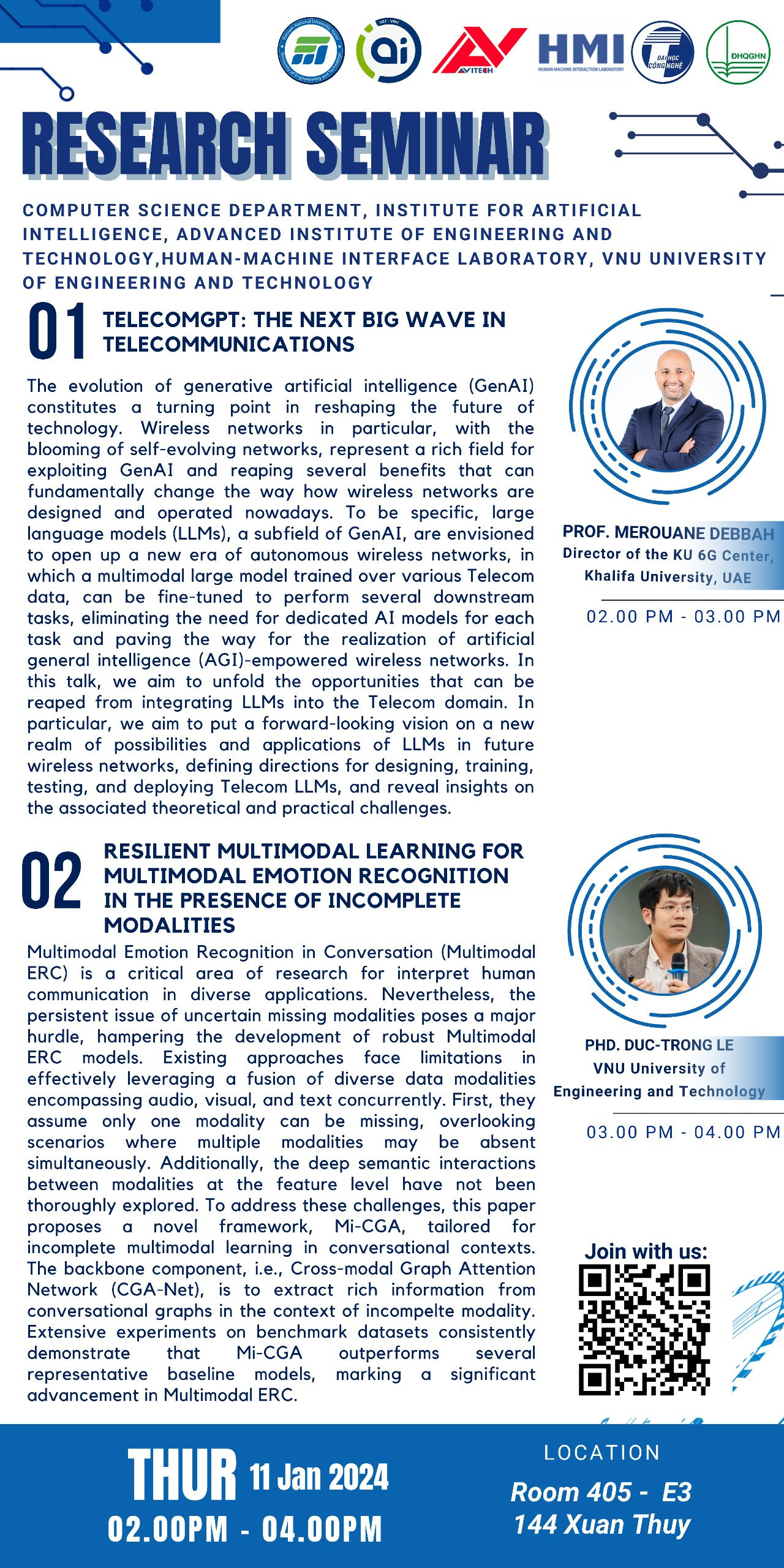Xin gửi tới các Thầy/Cô giáo, các bạn NCS/HVCH/Sinh viên thông tin buổi seminar đầu năm 2024 trong chuỗi seminar khoa học định kỳ.
![]() Thời gian: 14:00 – 16:00, thứ 5, ngày 11/1/2024
Thời gian: 14:00 – 16:00, thứ 5, ngày 11/1/2024
![]() Địa điểm: Phòng 405 E3
Địa điểm: Phòng 405 E3
![]() Chương trình
Chương trình
𝟏)𝐃𝐫. 𝐋𝐞̂ Đ𝐮̛́𝐜 𝐓𝐫𝐨̣𝐧𝐠: Resilient Multimodal Learning for Multimodal Emotion Recognition in the Presence of Incomplete Modalities
Multimodal Emotion Recognition in Conversation (Multimodal ERC) is a critical area of research for interpreting human communication in diverse applications. Nevertheless, the persistent issue of uncertain missing modalities poses a major hurdle, hampering the development of robust Multimodal ERC models. Existing approaches face limitations in effectively leveraging a fusion of diverse data modalities encompassing audio, visual, and text concurrently. First, they assume only one modality can be missing, overlooking scenarios where multiple modalities may be absent simultaneously. Additionally, the deep semantic interactions between modalities at the feature level have not been thoroughly explored. To address these challenges, this paper proposes a novel framework, Mi-CGA, tailored for incomplete multimodal learning in conversational contexts. The backbone component, i.e., Cross-modal Graph Attention Network (CGA-Net), is to extract rich information from conversational graphs in the context of incomplete modality. It consists of three key modules: reconstruction of missing data with Modality Feature Estimation, improving data understanding with the Graph Attention Network, and enhancing cross-modal relationships with the Cross-modal Attention Network, leading to better multimodal emotion recognition performance. Extensive experiments on benchmark datasets consistently demonstrate that Mi-CGA outperforms several representative baseline models, marking a significant advancement in Multimodal ERC.
————————
Bio: Dr. Duc-Trong Le is currently the Deputy Head of Computer Science department, Faculty of Information Technology (FIT), University of Engineering and Technology, Vietnam National University, Hanoi (VNU-UET). He received the Bachelor in IT from (VNU-UET) in 2011 and earned his Ph.D. in Information Systems from Singapore Management University, Singapore, in 2019. His research interests include Web/Text Mining, Recommendation Systems, Multimodal Learning and Reliable AI. He is the author, and co-author of more than 20 scientific articles that appeared in top-tier conferences such as IJCAI, AAAI, EMNLP, ACM MM, COLING, ECML-PKDD. He is also serving as Reviewer for AI conferences namely IJCAI, AAAI, and Q1 journals including TKDE, TKDD, TITS, NEUCOM. Additionally, he is the principal investigator or researcher in various AI research projects on Reliable AI (QG23.37), Medical AI (KC4.0-40\19-25), Environmental AI (VinIF.2023.DA019) and Behavioral AI (VinIF.2022.DA0087). More details about his research and teaching works are available at https://sites.google.com/view/trongld
𝟐) 𝐏𝐫𝐨𝐟. 𝐌𝐞𝐫𝐨𝐮𝐚𝐧𝐞 𝐃𝐞𝐛𝐛𝐚𝐡, 𝐃𝐢𝐫𝐞𝐜𝐭𝐨𝐫 𝐨𝐟 𝐭𝐡𝐞 𝐊𝐔 𝟔𝐆 𝐂𝐞𝐧𝐭𝐞𝐫, 𝐊𝐡𝐚𝐥𝐢𝐟𝐚 𝐔𝐧𝐢𝐯𝐞𝐫𝐬𝐢𝐭𝐲, 𝐔𝐀𝐄
The evolution of generative artificial intelligence (GenAI) constitutes a turning point in reshaping the future of technology in different aspects. Wireless networks in particular, with the blooming of self-evolving networks, represent a rich field for exploiting GenAI and reaping several benefits that can fundamentally change the way how wireless networks are designed and operated nowadays. To be specific, large language models (LLMs), a subfield of GenAI, are envisioned to open up a new era of autonomous wireless networks, in which a multimodal large model trained over various Telecom data, can be fine-tuned to perform several downstream tasks, eliminating the need for dedicated AI models for each task and paving the way for the realization of artificial general intelligence (AGI)-empowered wireless networks. In this talk, we aim to unfold the opportunities that can be reaped from integrating LLMs into the Telecom domain. In particular, we aim to put a forward-looking vision on a new realm of possibilities and applications of LLMs in future wireless networks, defining directions for designing, training, testing, and deploying Telecom LLMs, and reveal insights on the associated theoretical and practical challenges.
————————–
Bio: Mérouane Debbah is Professor at Khalifa University of Science and Technology in Abu Dhabi and founding Director of the KU 6G Research Center. He is a frequent keynote speaker at international events in the field of telecommunication and AI. His research has been lying at the interface of fundamental mathematics, algorithms, statistics, information and communication sciences with a special focus on random matrix theory and learning algorithms. In the Communication field, he has been at the heart of the development of small cells (4G), Massive MIMO (5G) and Large Intelligent Surfaces (6G) technologies. In the AI field, he is known for his work on Large Language Models, distributed AI systems for networks and semantic communications. He received multiple prestigious distinctions, prizes and best paper awards (more than 40 IEEE best paper awards) for his contributions to both fields and according to research.com is ranked as the best scientist in France in the field of Electronics and Electrical Engineering. He is an IEEE Fellow, a WWRF Fellow, a Eurasip Fellow, an AAIA Fellow, an Institut Louis Bachelier Fellow and a Membre émérite SEE. His recent work led to the development of NOOR (upon it release, largest language model in Arabic) released in 2022 and Falcon LLM (upon its release, top ranked open source large language model) released in 2023.
